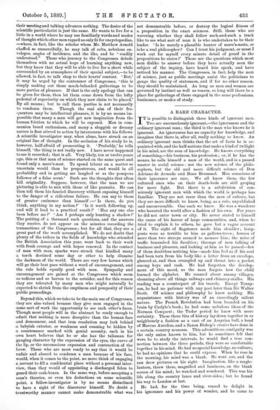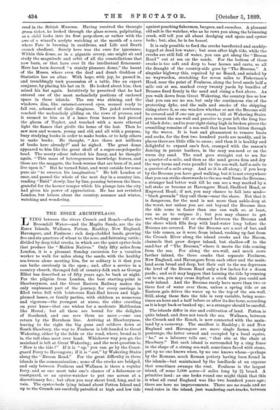A RARE CHARACTER.
IT is possible to distinguish three kinds of ignorant men. Two are unconsciously ignorant,—the ignoramus and the ordinary ignorant man ; the third is the man who knows he is ignorant. An ignoramus has no capacity for knowledge, and imagines that there is, after all, really nothing to know. An ordinary ignorant man thinks that the set of facts he is ac- quainted with, and the half-notions that make a kind of twilight in his mind, are the sum of knowledge. He knows everything of something,—his business, his profession ; or, if he has the means, he calls himself a man of the world, and is a passed master in social science : not the new science of the philo- sophers, but the old and more difficult science of Don Adriano de Armado and Beau Brummel. Men conscious of their ignorance are rare. We all know them, the few cultured ones who on their death-beds are still groping for more light. But there is a subdivision of con- sciously ignorant men with which the world is perhaps less familiar. They are not rarer than the men of culture, but they are more difficult to know, being, as a rule, unpublished and unconversable. One such we knew. He was a wanderer who haunted the world after a fashion of his own. For years he did not enter town or city. He never stated to himself the cause of his horror of large communities, and, when he tried to explain it to others, he gave but a vague account of it. The sight of flagstones made him shudder ; lamp- posts were as terrible to him as gallows-trees ; houses of more than two storeys seemed to menace him ; the noise of traffic benumbed his faculties ; throngs of men talking of business and pleasure, and looking at him as he passed—few of them doubtless noticing him—made him feel as if his soul had been torn from his body like a letter from an envelope, glanced at, and then crumpled up and thrust into a pocket among keys and cash. He had forgotten the develop. ment of this mood, as the man forgets how the child learned the alphabet. He roamed about among villages, shunning above all things railways and chimney-stalks. His reading was a counterpart of his travels. Except Tenny- son, he had no patience with any poet later than Sir Walter Scott. Of science and philosophy he knew nothing. His acquaintance with history was of an exceedingly salient
nature. The French Revolution had been branded on his brain by Carlyle's book; he had some nebulous ideas of the Norman Conquest ; the Tudor period he knew with more certainty. These three bits of history lay down together in as neighbourly a fashion as a cast of an Assyrian bull, a head of Marcus Aurelius, and a Saxon Bishop's crozier have done in a certain country museum. This adventitious contiguity was the only union known to him, but he sometimes felt that were he to study the intervals, he would find a true con.
nection between the three periods, they were so comfortable together in his mind. He had no special knowledge, no culture; he had no opinions that he could express. When he rose in the morning, his mind was a blank. He went out, and the sun drew pictures on his sight. Imagination, like a magic- lantern, threw these, magnified and luminous, on the blank screen of his mind; he watched and wondered. This was his life along the country lanes and river-sides ; but he found his way to London at last.
He had, for the time being, ceased to delight in his ignorance and his power of wonder, and he came to
read in the British Museum. Having received the thenrgie green ticket, he looked through the glass screen, palpitating, as a child looks into its first peep-show, or rather with the awe of a wizard's acolyte watching at the month of a cave where Fate is brewing in cauldrons, and Life and Death crouch obedient. Surely here was the cure for ignorance. Within this dome, as in a gigantic orrery, one might sit and study the magnitude and orbit of all the constellations that now burn, or that have ever lit the intellectual firmament. Here has been decreed " a stately pleasure dome," the haunt of the Muses, where even the deaf and dumb Goddess of Statistics has an altar. With hope, with joy, he passed in, and tremblingly took possession of a table, like an expert conjurer, by placing his hat on it. He looked about him, then seized his hat again. Intuitively he perceived that he had entered one of the most melancholy portions of enclosed space in these islands. The sun was shining, and the windows, dim, like cataract-covered eyes, seemed ready to fall out, ashamed of their dinginess. The jaded sunbeams reached the melancholy gilding on the rows of presses, and it seemed to him as if a lance from heaven had pierced the gloom of Tophet, and touched with a more ethereal light the flames that girdle the home of the lost. Then he saw men and women, young and old, and all with a purpose, busy studying books in order to make books, or to help others to make books. He thought, " Are there not millions of books here already P" and he sighed. • The great dome appeared to him like the great skull of a super-encyclopedic head. The musty odour infected his fancy, and he thought again, " This mass of heterogeneous knowledge festers, and these are the maggots, the book-worms that are born of it, and live upon it" But he turned faint, and went outside for some pure air " to sweeten his imagination." He left London at once, and passed the whole of the next day in a country inn, reading "Enid" slowly, line by line, pausing between the lines, grateful for the keener temper which his plunge into the city had given his power of appreciation. He has not revisited London, but loiters about the country, summer and winter, watching and wondering.







































 Previous page
Previous page